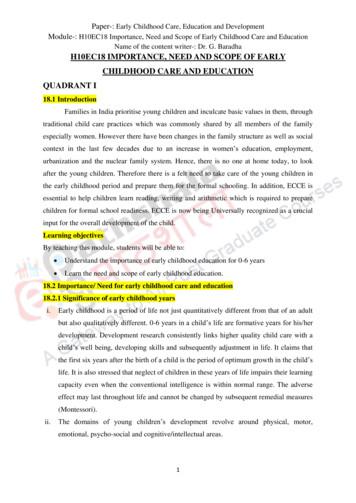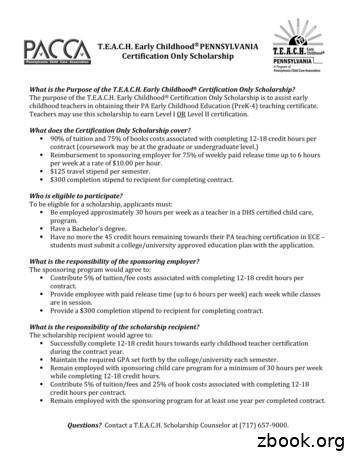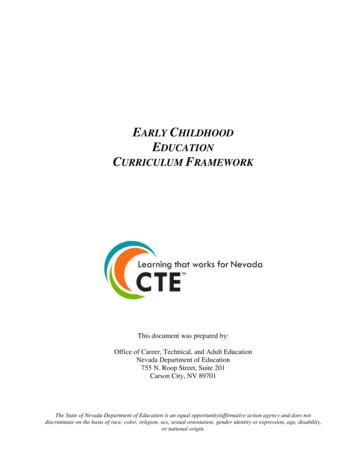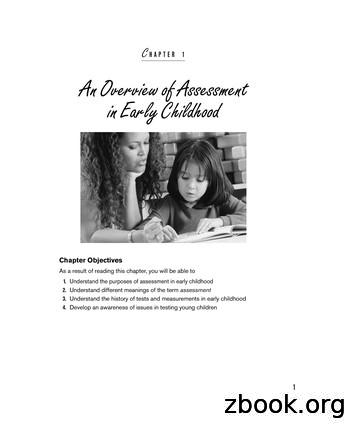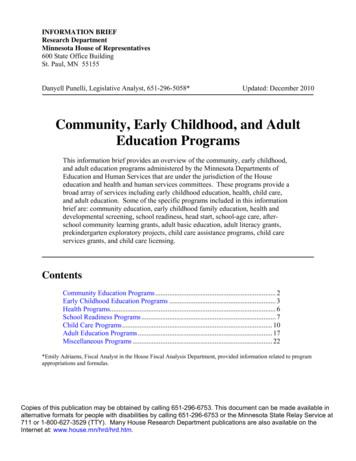ECEP Parent Handbook - Early Childhood Education Program
PARENTHANDBOOKEARLY CHILDHOOD EDUCATION PROGRAMece.berkeley.edu
3TABLE OF CONTENTSFacility Location, Center Directorsand License Numbers . 4Classroom Phone Numbers . 5Welcome . 7Purpose of this Handbook . 7About the Early Childhood Education Program (ECEP),UC Berkeley. 7Our Philosophy . 7Clothing and Nap Equipment . 13Children’s Personal Belongings . 14Child Abuse Reporting . 14Prevention of Illness . 14Policy Regarding Sick Children . 14ECEP Medication Administration Policy . 16 Medication Administered in Allof Our Child Care Centers: . 16The Difference between Day Careand Child Development . 8Program Safeguards to Prevent Medication Errors . 16Curriculum . 8Handling Emergencies . 17Our Goals for Children . 8Payment of Fees . 18Social/Emotional . 8Excused Absences . 18Cognitive/Language/Pre-Literacy . 8Health . 8Physical Development . 8Daily Program Routine and Schedules . 8Preschool and Older Toddler Program Schedule . 9Child Assessments . 9Research/Observation . 10Behavior Management and Discipline . 10Health, Community and Social Services . 10Sunscreen and Topical Ointments . 17Family Emergency Absences . 18Unexcused Absences . 18Termination of Services . 18Grievance and Complaint Procedures . 19Parents’ Rights . 19Children’s Personal Rights . 19Rights of the Licensing Agency . 20Parental Appeal Procedures (State Subsidy Only) . 20Teaching Staff . 11More Information about State Subsidized Spaces(Financial Assistance) . 20School Calendar and Holidays . 11Eligibility . 20Parent Participation and Involvement . 11Eligibility Criteria . 20Code of Conduct for Parents . 12Policies and Procedures . 12Arrival and Departure from the Classrooms . 12Late Pick-Up . 12Rules for Driving/Riding Safety and Conduct . 13Nutrition Program & Meal Service . 13Birthdays and Special Events . 13Need Criteria . 20Appendix . 21 The UC Berkeley ECEP Uniform Complaint Procedures(State Subsidy only) . 21 ECEP Civil Rights and Complaint Proceduresfor Child Nutrition Programs . 21
5EARLY CHILDHOOD EDUCATIONPROGRAM CONTACTSClassroom Phone NumbersEarly Childhood Education Program, UC Berkeley Administrative Office2339 Haste Street, Berkeley, CA 94720-7416General Information (510) 642-1827Email: ecep@berkeley.eduAdmin/Admissions Fax: (510) 642-8033Website: ece.berkeley.eduFederal Tax ID #: 94-60021AdministrationExecutive DirectorDarrell Whitacre: (510) 643-6144dwhitacre@berkeley.eduAssociate DirectorKristen Burmester: (510) 643-6145kburmester@berkeley.eduFacility Location, Center Directors and License NumbersClark Kerr Infant/Toddler Center & PreschoolBldg. 5 & 152601 Warring Street(510) 642-8442Facility Numbers: 013421386 (I), 010216245 (T), 013420895 (PK)Center Director: Yelena ZakharyevichSite Coordinator: Leslie CraigDwight Way Child Development Center2427 Dwight Way(510) 642-0104Facility Number: 013421424Center Director: Eufemia “Buena” RoweSite Coordinator: Jane EspositoContracts/Enrollment CoordinatorMarina Moreida: (510) 643-1482moreida@berkeley.eduHarold E. Jones Child Study Center2425 Atherton Street(510) 643-5449Facility Number: 010212490Center Director: Bonnie SarrSite Coordinator: Vanna-Maria KalofonosHaste St. Child Development Center2339 Haste Street(510) 642-8426Facility Numbers: 013418965 (I&T)& 013418966 (PK)Center Director: Boris AlvaradoSite Coordinator: Sasha LevetonCenterClark Kerr Child Development CenterClassroomInfantToddlerPreschoolPhone Number(510) 643-5527(510) 642-5313(510) 643-0267Dwight WayInfant 1Infant 2Toddler 1Toddler 2(510) 642-6724(510) 642-0066(510) 642-5579(510) 642-6293Harold Jones Child Study CenterPreschool WestPreschool East(510) 643-5339(510) 643-1244Haste Street Child Development CenterInfant WestInfant EastToddler WestToddler EastPreschool WestPreschool East(510) 642-6618(510) 642-6605(510) 642-6640(510) 642-6639(510) 642-6691(510) 642-6688University Village, Albany Child Development CenterMaple 1Maple 2(510) 527-1382(510) 527-1387University Village-Albany1123 Jackson StreetAlbany, CA(510) 827-1388Facility Number: 013420548Center Director: Iris BradfordHead Teacher: Laureana Medranoece.berkeley.eduRESIDENTIAL AND STUDENT SERVICE PROGRAMS
7EARLY CHILDHOODEDUCATION PROGRAMWELCOMEWelcome to UC Berkeley’s award–winning Early ChildhoodEducation Program (ECEP). ECEP provides quality early care andeducation services to over 250 children (ages range from threemonths to five years old). The program is designed to serveyoung children of the UCB community, including students, staff,faculty and post-docs. Community families are also eligible toapply.We have high expectations for all children and believe parents,teachers and the broader community are necessary for theirsuccess in school and life. We view parents as critical partners insupporting children’s optimal development while their childrenare in group care. Through partnerships with students andvarious campus departments, ECEP continues to serve themission of the University with teaching, research and publicservice. We hope you enjoy your time with us, and look forwardto working with you and your child(ren).We are proud of our child development programs, and realizethat it is you, the parent, who has the most influence on yourchild’s development and education. Therefore, in order for yourchild to obtain the maximum advantage from our program, yourhelp, participation and opinions are encouraged. We invite youto become an active participant in your child’s program throughthe Parent Advisory Committee (PAC) that exists at each Center,fundraising and/or volunteering. We encourage you to talk to yourchild’s teacher or call ECEP if you have any concerns or questions.Thank you for supporting your child’s early development and theUC Berkeley Early Childhood Education Program.PURPOSE OF THIS HANDBOOKPlease use this handbook to familiarize yourself with our program,what to expect for your child in a group care environment andthe policies and procedures which help us function at a high level.It is your responsibility to read and follow the policies outlinedand to ask for help or explanation if needed.ABOUT THE EARLY CHILDHOOD EDUCATIONPROGRAM (ECEP), UC BERKELEYWELCOMEEARLY CHILDHOOD EDUCATION PROGRAMUC BERKELEYECEP is a department within Residential and Student ServicePrograms (RSSP), under the leadership of Student Affairs. Ourprogram provides quality care and education for children of theUC Berkeley community, including faculty, students and staff.Our mission is to provide high quality early childhood educationand child care services to enhance optimal growth and learningfor your child. We believe high expectations for all children andpositive attitudes and support from parents, teachers and thebroader community are necessary for student success in schooland life. We view parents as critical partners in supportingchildren’s optimal development while their children are in ourcare.ECEP serves children ages three months through preschool. Thehours of operation are from 7:45 a.m. to 5:30 p.m, Monday-Friday.We are licensed by Title 22 of Community Care Licensing, andsince we also serve low income students across our program withfunding from the Department of Education, Title 5, we followtheir requirements as well.OUR PHILOSOPHYECEP believes in building a working partnership with parents,family and the community to provide a child developmentprogram that nurtures a healthy sense of self-worth, fosters thedevelopment of skills in all developmental domains, encouragesthe development of independence and promotes diverse culturalvalues and acceptance.We believe in providing a loving, supportive environment wherewell-trained, sensitive staff appreciate the uniqueness of eachchild. Staff should encourage children to feel empowermentover her or his life through independence, trial and error andsuccessful challenges. Our program is based on sound earlychildhood education child development theory and practices,which are developmentally appropriate and child centered.
89THE DIFFERENCE BETWEEN DAY CARE ANDCHILD DEVELOPMENTWe value the importance of Early Childhood Education in ourprograms, as well as the staff who work here. Care is provided byteaching staff trained in developmentally appropriate practicesfor children. This means that the children are engaged in learningthroughout the day, including lunch time, rest time, outside play,etc. In order for children to learn and be ready for school and life,staff must provide a safe, nurturing environment where childrenexperience activities including sharing, exploring, testing limits,making mistakes and trying again.CURRICULUMECEP believes children learn best through play, and ourcurriculum incorporates both teacher initiated and child-initiatedactivities as well as small/large group activities. Teaching staffin our infant and toddler classrooms support the primary carepractices of the PITC philosophy (Program for Infant and ToddlerCare). We feel that a child-centered program is most appropriatefor children in our infant, toddler, and preschool programs.Our classrooms provide rich learning environments with ageappropriate yet challenging play equipment and materials,learning centers that encourage exploration and discovery,discussion, and child and adult interaction. Teachers plan activitiesbased on children’s interests and our goals for their learning ofcontent and skills. Primary caregivers are assigned to infants andtoddlers. All teachers and teacher assistants work to developpositive relationships with you and your child. It is the teacher’sresponsibility to keep you informed of your child’s progress andkeep the lines of communication clear and open. Teachers willconduct your parent conferences, your child’s assessments andtransitions to your child’s next educational setting.OUR GOALS FOR CHILDRENDaily activities are designed to provide age-appropriateexperiences in the following early childhood developmental areas:Social/Emotional Getting along in groups Learning responsible behavior (e.g. sharing, cooperation) Respecting ethnic, cultural and age differences Expressing feelings appropriately Gaining positive self-image Developing independence, initiative and trustCognitive/Language/Pre-Literacy Acquiring early language and literacy skills, including prereading and early writing skills for older children Learning numeracy (pre-math) and science concepts Increasing curiosity about the world through observation,exploration and experimentation Enhancing language skills and self expression through music,movement and interactive dialogue between peers and adults Promoting experimentation, inquiry, observation andexploration through playunder the supervision of one of our teachers. Teachers will assessthe readiness for children to attend walking and/or field trips.Health Modeling good eating habits and nutrition Practicing good hygiene habits (including hand washing andtoileting) Learning to balance adequate rest periods with activity times Sharing healthy, nutritious food throughout the dayInfants and young toddlers are cared for in a nurturing andstimulating environment using some of the primary carepractices of the PITC (Program for Infant and Toddler Care)model of responsive caregiving, which incorporates observation,documentation and interpretation of a child’s experiences. Theirneeds are attended to throughout the day, providing food, sleep,comfort and play as needed according to their temperamentand comfort level. As children grow, more activities are added toprovide stimulation and fun for children’s developmental growth.Physical Developmentlarge and small muscle skills Improving eye-hand coordination and perceptual skills Increasing body awareness Exploring and participating in rhythm and movement activities Developingspecial events in school or the community, sharing experiencesand belongings from home, singing songs and sharing aninteractive story. Children have opportunities to get to knowall their classmates as they learn new concepts and practicecommunication and social skills, such as taking turns. Music andmovement activities may also be conducted during circle time.Small group learning activities are planned and directed byteachers related to curriculum topics in the areas of language arts(e.g. letter recognition and sounds), mathematics (e.g. countingand sorting objects, measuring liquids), science (e.g. properties ofmagnets), art projects, cooking projects and sensory explorationfor younger children.DAILY PROGRAM ROUTINE AND SCHEDULESChildren thrive in a program environment that offers a variety ofactivities in a rich, well-equipped classroom with a consistent butflexible daily schedule. They depend on predictable routines andlook forward to different parts of the day. Learning opportunitiesare available to them in unstructured and structured formatsincluding free play/choice times, small or large group activitiesand routines such as eating, dressing and toileting/washing.Throughout all types of activities, the interactions betweenteachers and children are critical to children’s learning, social,self-image and communication skills. Teachers strive to get toknow each child’s unique strengths and needs so they can provideindividualized learning opportunities and guidance in a caring,supportive atmosphere.During free play/choice periods, children may select one or moreactivities from the many learning centers, such as block building,dramatic play, art, music, books, manipulatives (like puzzles,building sets), science and nature study, outdoor activities andmuch more. They may play/work alone, with a friend or in asmall group, with a teacher’s guidance or independently. As theyfinish, they may choose another activity after putting away theirmaterials or toys.Circle time is conducted by the teacher or teacher assistantand may consist of planning or discussing the day’s activities orOutdoor play is an essential part of the children’s day, too.Children get vigorous exercise and gain physical strength,coordination and skills through running, climbing, ball play andcooperative games. For younger children this would includewalks, exploring the environment and taking activities outside.Routine activities such as snack or rest time, toileting andhand-washing are important opportunities for children to learnself-care skills, good health habits and independence.As an urban city, Berkeley has many opportunities for explorationand excitement. As part of our program and curriculum,teachers may go on walks and field trips with children. Walkingtrips through our urban community include nature walks, tripsto campus and locations in our neighborhood. We may alsoexperience heavy traffic. Parents must sign a consent form at thebeginning of each year for walking trips of 30 minutes or less.Field trips to specific locations must be planned in advance andparents will be given a consent form to sign for the specific fieldtrip event. Children who are not ready, cannot follow instructionsto stay with the group, have difficulty keeping up with the group,become easily distracted for walking trips or field trips or childrenwhose parents have not given consent will stay at the centerInfants and toddlers learn through exploring their environment,interacting with peers and adults, and expression of wants andneeds through verbal and non-verbal cues. Our infant programsprovide rich learning environments with nurturing staff who arein tune with the individual needs of each infant in their care.All of the types of activities described above are planned duringthe children’s day. See below for a typical classroom schedule:PRESCHOOL AND OLDER TODDLERPROGRAM SCHEDULE7:45 Greet children & parents, wash hands, health check,quiet play8:45Wash for breakfast, eat, clean up10:00 Circle time/large group time10:30Small group activities/outdoor play/clean up11:15Outdoor play/set up for lunch12:00Lunch12:30Story/outdoor play12:45Nap/rest time2:30End of rest time3:00Snack, free play, clean up3:30Large or small group time/project time4:00Outdoor play time4:30Large group/circle/story time5:00Games or quiet play/clean up5:30Center closesCHILD ASSESSMENTSTeachers and teacher assistants make observations andcreate portfolios for every child. All children are assessedusing the California Department of Education Desired ResultsDevelopmental Profile. Our curriculum is reflective of the State’srequired learning goals: Children are personally and socially competent Children are effective learners Children are safe and healthy Children show physical and motor competence
1011school. Please feel free to discuss any needs for health (physical/mental), social services, recreational or other needs with theteacher, site coordinator, or center director. University HealthServices are available to faculty, staff and students. These mayinclude services for mental health, behavior, elder care, genderand equity and work/life issues. Please access the UC Berkeleywebsite for more information.TEACHING STAFFAfter each assessment, the results are shared with the familyduring a parent-teacher conference. Parents are encouragedto continue the children’s learning activities in the home withstories, outings, songs and helping around the house to teachimportant skills. Assessments are then used in program planningto assure optimal developmental growth of each child.RESEARCH/OBSERVATIONOur programs incorporate a research component which may ormay not apply to your child’s classroom. If you are asked to haveyour child involved in any research activities, you will be notifiedahead of time and you may choose to be involved. Qualifiedsubstitute teachers accompany the researcher and the childwhile they are involved in a research activity, typically describedas “playing a game.” Informal observations of classrooms byEarly Childhood, Psychology, Sociology or Education students orUniversity representatives may occur at any time without parentnotification.BEHAVIOR MANAGEMENT AND DISCIPLINEAn important aspect of learning in early childhood is how tointeract appropriately with others, control one’s own behaviorand understand social rules. As children learn about the worldand acquire social interaction skills (such as how to approachothers and join play), they may exhibit “mistaken behavior”—trying a strategy that’s not suitable; may not be intending to“misbehave.” At other times, children may act inappropriately togain attention or for other reasons. In any case, we will not allow achild’s behavior to continue if it appears that a child will hurt him/herself, someone else or if property will be damaged. We believethat children learn acceptable behaviors by modeling the actionsof those around them, including parents, teachers and otherchildren.We expect our teachers to implement this policy with techniquesthat help children learn positive strategies for interaction andproblem-solving, understand the perspectives of others and whya specific behavior is not acceptable and to gain self-control.Discipline used by the ECEP teachers includes a variety ofconstructive techniques such as, redirecting children to otheractivities, counseling the child in a calm but firm voice about thesituation, offering positive alternatives for behavior or gentlyseparating the child from the group for a brief period of time.Physical punishment and humiliation are never permitted at ourschool, by staff, children or parents.Discipline in our classrooms must be free from corporal orunusual punishment, infliction of pain, humiliation, intimidation,ridicule, coercion, threat, mental abuse, or other actions of apunitive nature, including but not limited to: interference withthe daily living functions, including eating, sleeping, toileting, orwithholding of shelter, clothing, medication or aids to physicalfunctioning. This is the policy of UCB ECEP and California law.Children with significant behavior difficulties, such as repeatedhitting or biting other children or staff, will be observed and theirbehavior documented. Staff may confer at times with a mentalhealth consultant to help determine causes and possible solutionsto inappropriate behaviors. We will do our best to work with youand your child to improve any inappropriate behavior. Usually,a conference will be requested with parents to discuss possiblemethods of dealing with problem behaviors once staff has madeseveral observations. Working with a child’s behavior consistentlyat home and school is essential for improvement. Parents andstaff must have shared understanding of the reasons for thebehavior and strategies for managing it.Referral to support services may be made by the teachingstaff if unacceptable behaviors continue to occur. Parents maybe asked to seek counseling or attend parenting class as acondition for their child to continue in the child developmentprogram. However, we do consider it in everyone’s best interestto exclude a child or parent who exhibits a continuing problemthat threatens the safety of other children, staff or the child.Classroom settings and group activities are not appropriate for allchildren. If we determine that our program is not appropriate foryour child, or that you or your child constitutes a safety or legalhazard, we reserve the right to withdraw services.HEALTH, COMMUNITY AND SOCIAL SERVICESThe ECEP staff will review your family’s needs with you uponenrollment and on an annual basis in order to help you findresources you and your family may need. Berkeley has manyresources both on the school site as well as near your child’sAll teachers and teacher assistants, including substitutes whoare needed for planned and unplanned leaves, are hired basedon their education, experience, creativity, warmth and caringfor children. We want to assure the highest quality care andeducation for your child. All teachers hold California ChildDevelopment permits and many have A.A., B.A. or Mastersdegrees. We encourage all staff to continue their professionaldevelopment through college coursework, conferences and inservice training.We receive a limited amount of funding from the CaliforniaDepartment of Education and the federal government. Inclassrooms that serve low income students, we meet EducationCode (Title 5) staffing requirements that exceed those inCommunity Care Licensing regulations (Title 22). Title 5 requiresthat for the majority of the day we maintain a 1:3 adult–to-childratio in the infant rooms, 1:4 adult–to-child ratio in the toddlerrooms; and 1:8 adult-to-child ratio in the preschool rooms. Ourclassrooms are typically staffed with two fully qualified teachers,one teacher assistant and student assistants.activities with other families. We also require that parentsmaintain standards of confidentiality towards other families andchildren enrolled in the program, respecting individual differencesand working to help provide a safe and supportive environmentfor children, families, teaching and administrative staff.All parents who choose to participate in the classroom arerequired to provide vaccination records for influenza, measles,mumps, rubella, pertussis (whooping cough) as well as proof ofTB clearance.Here are some ways parents can be involved: Parent participation in the classroom can be scheduledthrough your classroom’s teacher. One hour per weekin your child’s classroom can be beneficial to your childas well as help the teachers to create a stimulating andfun environment for all of the children. All volunteerswork under the direct supervision of teachers. Pleaseask how you can become involved in the program. Ifyou are unable to participate directly due to schedulingconflicts or other circumstances, you may be ableto take materials home or contribute in anotherway. Please consult your child’s teacher or the sitecoordinator for scheduling.SCHOOL CALENDAR AND HOLIDAYS Parent-teacher conferences are held at least twiceper year. Teachers are also available to meet withyou more often at your convenience to discuss yourchild’s progress or address a concern that may arise.We encourage ongoing communication between thestaff and parents. Please feel free to ask questionsabout our program, or make suggestions, which youfeel would enrich your child’s experience at school.The parent-teacher conference is a time to learn moreabout your child’s activities in school, developmentalprogress and ways you can support your child’slearning and readiness for kindergarten. Mattersregarding child and parent conferences are to be keptconfidential.PARENT PARTICIPATION AND INVOLVEMENT Parent Advisory Committee (PAC) consists ofparent representatives who meet at each ECEPcenter approximately once per month. They makerecommendations regarding the operation of theprogram to the center director. They also may planceremonies, family activities, fundraising and otherevents. See your center director if you are interested inserving as a PAC representative.For the safety of your child, references, physical health report(including T.B. clearance) and criminal record check are gatheredupon hire for all paid staff.We operate year-round centers and observe university holidays.We also schedule professional development, clean-up/trainingdays and allow for staff to transition during certain times ofthe year. A calendar for the year is provided to all parents uponenrollment and is subject to change with prior notice to parents.Please contact your child’s teacher or the enrollment office forany questions you may have regarding the ECEP calendar. Ourcalendars and instructions on how to add the calendar onto yourGoogle calendar are on our website: https://ece.berkeley.edu/resources.Your direct involvement with your child’s classroom will increasethe benefits he/she derives from the program. ECEP has an opendoor policy to encourage parents to participate in the dailyactivities whenever possible. Please offer your time, your talentsand donations to the classroom and attend evening or weekend
1213CODE OF CONDUCT FOR PARENTSWhen parents are volunteering, visiting classes or assisting withmeal service or field trips, they are expected to: Treat children with respect, compassion and empathy Understand how to support children’s rights Support an environment that promotes health and safety Mo
RESIDENTIAL AND STUDENT SERVICE PROGRAMS Early Childhood Education Program, UC Berkeley Administrative Office 2339 Haste Street, Berkeley, CA 94720-7416 General Information (510) 642-1827 Email: ecep@berkeley.edu Admin/Admissions Fax: (510) 642-8033 Website: ece.berkeley.edu Federal Tax ID #: 94-60021 Classroom Phone Numbers
Understand the importance of early childhood education for 0-6 years Learn the need and scope of early childhood education. 18.2 Importance/ Need for early childhood care and education 18.2.1 Significance of early childhood years i. Early childhood is a period of life not just quantitatively different from that of an adult
T.E.A.C.H. Early Childhoodâ PENNSYLVANIA Certification Only Scholarship What is the Purpose of the T.E.A.C.H. Early Childhood Certification Only Scholarship? The purpose of the T.E.A.C.H. Early Childhood Certification Only Scholarship is to assist early childhood teachers in obtaining their PA Early Childhood Education (PreK-4) teaching certificate.
Early Childhood Education I L1 Early Childhood Education II L2 Early Childhood Education III L3C Early Childhood Education Advanced Studies AS The core course sequencing with the complementary courses provided in the following table serves as a guide to schools for their programs of study.
CHAPTER 1 An Overview of Assessment in Early Childhood Understanding Assessment in Infancy and Early Childhood Not too long ago, resources on early childhood assessment were limited to occa-sional articles in journals, chapters in textbooks on teaching in early childhood pro-grams, and a few small textbooks that were used as secondary texts in .
ECE 240 - Administration of Early Childhood Care and Education Programs (3) ECE 241 - Administration: Human Relations for Early Childhood Education (3) Colorado Mesa University B.A. Early Childhood Education - Early Childhood Special Education Advisor: Vail Shoultz-McCole vshoultz@coloradomesa.edu 970-255-2674
Early Childhood Care, Development and Education (ECCDE) is a term that is used interchangeably worldwide but refers to the same concept of early childhood education and cognitive development. The World Bank for instance refers to it as Early Childhood Care and Education, whereas UNESCO refers to it as Early Childhood Development Care.
streams for early childhood and child care programs, making recommendations on how to coordinate and collocate early childhood and child care programs in one State Office of Early Learning, and reviewing program evaluations regarding high-quality early childhood programs. (Minn. Stat. § 124D.141)
The Python programming language is a recent, general-purpose, higher-level programming language. It is available for free and runs on pretty much every current platform. This document is a reference guide, not a tutorial. If you are new to Python programming, see the tu-torial written by Guido van Rossum . 3, the inventor of Python. Not every feature of Python is covered here. If you are .

